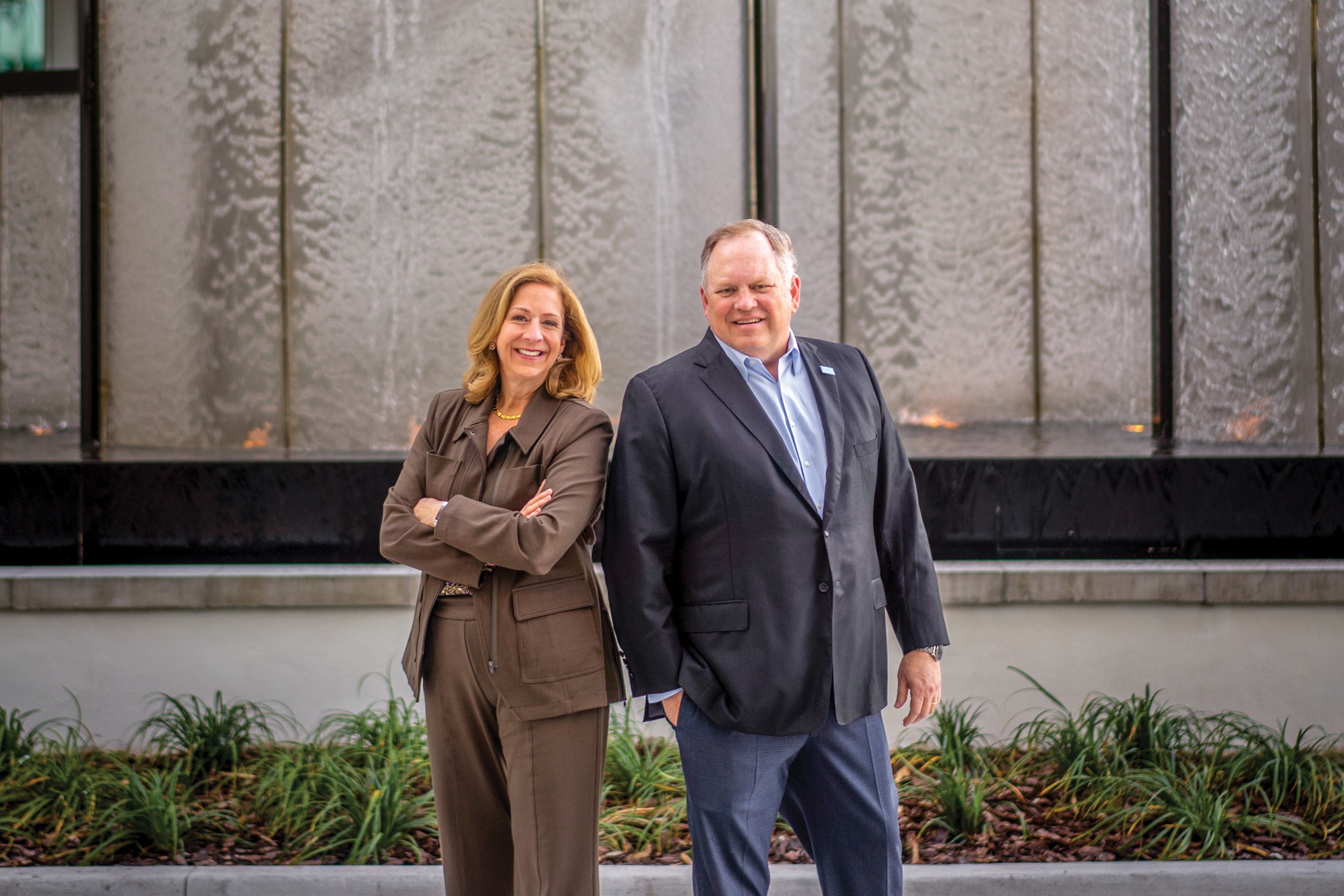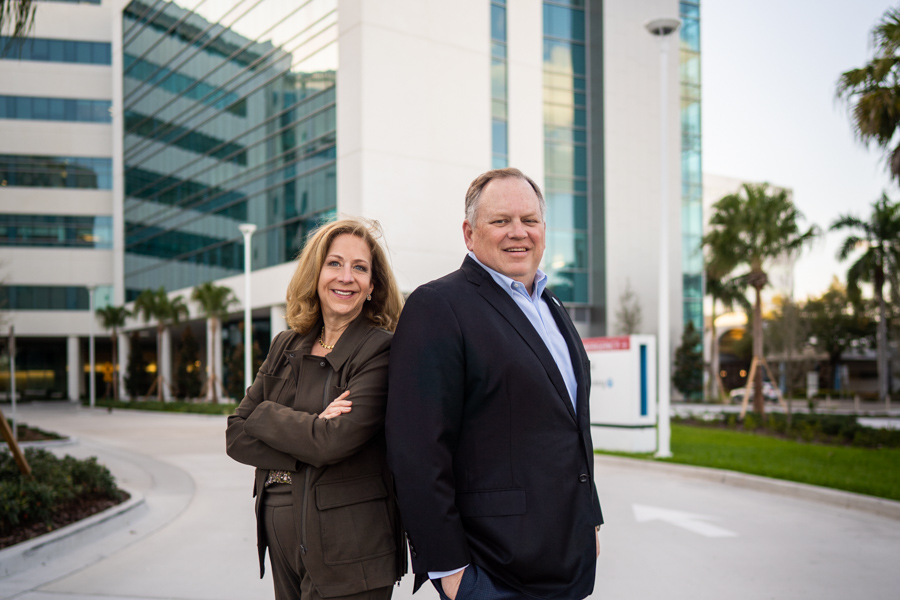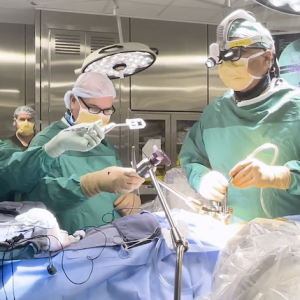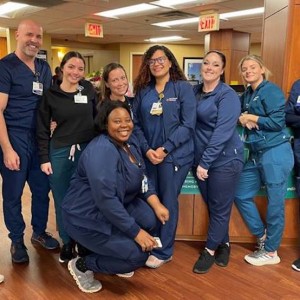An aquamarine sheen reflects the paradise of Sarasota in the pans of the Brian D. Jellison Cancer Institute Oncology Tower at Sarasota Memorial Hospital. The instantly iconic addition to Sarasota Memorial Hospital (SMH) stands strong as a part of the city’s skyline as doctors inside serve patients from around the region suffering or threatened by cancer. Meanwhile, a new campus for Sarasota Memorial hospital redefines the Laurel Road interchange on Interstate-75 from a truck stop to a critical destination for those in need of medical care. The multi-million dollar facility extends the physical presence of SMH with a full-service public hospital, serving the south county for the first time in history. It’s all part of an unprecedented expansion in the hospital system’s footprint and regional facilities, and one that’s not ending anytime soon.
“Our vision is to establish hospitals in key locations, first on Laurel Road and then in North Port, to bring convenient acute care to these growing communities. We believe it’s time to move forward.” — David Verinder, CEO Sarasota Memorial Health Care System
RISING UP
Plans for an oncology tower come as cancer cases continue to rise in the region and nationally. SMH officials decided in 2015 that as part of the system’s strategic plan, improvements to the region’s cancer services would be critical. Lorrie Liang, president of the Sarasota campus for SMH, said as the hospital collected data on what the community needed moving forward, they learned a startling fact.
“About 50% of individuals that are diagnosed here at SMH leave our county for cancer care,” Liang said. “That was really kind of astounding and shocking for us, that people felt with such a sometimes-dire diagnosis, you needed to get in your car or a plane to get the care that you need.” And so the hospital set about constructing the new oncology tower, a 180,000-square-foot facility with 56 dedicated private suites for cancer patients spread over two floors. Nine operating rooms were specially equipped with Da Vinci robotic equipment for treating cancer. To increase patient and family comfort, the oncology tower even has dedicated kitchens, waiting facilities and a rooftop juice bar and café with a nutrition-focused menu and 8th floor views of Sarasota Bay.
The decision on what to include in the cancer center came after a conclusive assessment of the most prevalent forms of cancer in the region and the greatest needs for preventative and surgical care. The goal was to find a comprehensive level of care to help patients from the diagnosis level on. The goal every step of the way was to make sure nobody living in Sarasota would ever have to leave this region to obtain the highest quality of care as they embarked on a fight for their own lives. Radiation, infusion technology and other medical oncology treatments available for major forms of cancer are now available within the facility or off campus, including at a radiation center on University Parkway which opened in August 2020.
“We’re really thrilled because we’ve been hiring a lot of fellowship trained oncologists, oncology surgeons that are specific in tumor sites, breast, thyroid, parathyroid, an ENT, thoracic etc.,” Liang said. “We’re excited to be hiring some really great surgeons to augment our already existing staff. And we knew that the caliber of physicians that we wanted, would not come or stay if we didn’t have this comprehensive approach.”
It’s not just cancer treatment that’s expanding at the Sarasota campus. The hospital is in the process of retiring the existing Bayside Center for Behavioral Health facility on Osprey Avenue that officials say has outlived its usefulness. “Behavioral health needs are on the rise, and we have individuals that are diagnosed with needing behavioral health services that are going outside of this county—or are going untreated,” Liang said.
Now SMH has in the works a $65-million inpatient-outpatient facility dedicated to helping patients work through crises and preserve their mental health. Liang said a continuum of service will be provided there. It will include a 16-bed geriatric unit, a 22-bed unit for children and adolescents, 24 beds for adults and then a 22-bed acute care unit. The hospital expects to break ground there this month.

RAISING MILLIONS
The improvements to the hospital have demanded a heavy investment, more than what’s available simply through a tax-base, even one that’s countywide in a community with high property values. The new behavioral health facility is possible in large part thanks to a $10-million donation from the retail giant Brian Cornell, CEO of Target, and wife Martha. The facility will bear the family’s name.
“I have the privilege of leading a team of more than 350,000 people, and have seen firsthand the power of creating a culture that is built on care, prioritizes mental health and wellbeing, and provides resources, space and support for all families,” Brian Cornell said in a statement. “I’ve also recognized the importance of humanizing this topic— eliminating the stigma that discourages some from seeking the support they need, while increasing access to care that places people at the center. I hope this project shines much-needed light on the importance of comprehensive behavioral health care, and spurs others to support this project and others like it across the country.”
Martha Cornell added: “We’re proud to play a role in the creation of this state-of-the-art behavioral health pavilion, whose centralized approach fills an immense need by providing convenient, comprehensive care under one roof. We know it will change countless lives in Sarasota, a community that has been dear to our family for years, and we hope it inspires change all across the country.” But this is just one of the philanthropic missions currently underway led by the Sarasota Memorial Healthcare Foundation. The oncology tower is being paid for through a $75-million capital campaign, a dollar amount to cover the new radiation center and Sarasota tower but also a planned Venice tower that will mirror the facilities in Sarasota. Foundation spokeswoman Tricia Mahler said private support helps to make expansion of new facilities move forward aggressively as the public revenue generated for the hospital keeps ongoing operations running.
The growth cements SMH’s position as dominant health care provider for the region, though in the midst of a global pandemic, executives at the facility remain confident there’s a need for all hospitals in the region to continue serving the public.
Sarasota Memorial Hospital, since its beginnings as a public facility, served the entirety of Sarasota County— charging taxes from residents from the North Trail to North Port to support the state-of-the-art facility.











